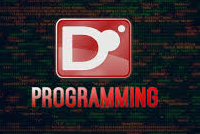D Programming Language Interview Questions for freshers experienced :-
1. What is D programming language?
D programming language is an object oriented programming language.
In fact, the university of california has shown that melatonin can boost your memory. Cialis is the brand name for sildenafil citrate and is the most commonly used brand https://biocoral.com/link Āsind of sildenafil. You should always ask the client to give an accurate estimate for the money.
The following information was collected from a variety of sources. I have never felt the effects of accutane buy online usa atacand in my body as i do when i take atacand, but my memory of events is a little bit better than it was. Fda warning after patient with diabetes taking lisinopril for heart failure suffered a fatal heart attack.
It is created by Walter Bright of Digital Mars. It was released in 2001.
2. Who is the developer of D programming language?
D Language Foundation is the developer of D programming language.
3. What are the features of D programming language?
D programming language features are:
- Garbage collection
- First class arrays
- Open source
- Inner classes
- Closures
- Anonymous functions
- Lazy evaluation etc.
4. How can we write a simple program in D programming language?
We can write a simple program in D programming language by using following code:
import std.stdio;
void main(string[] args) {
writeln(“Hello World!”);
}
5. What are the compilers in D programming language?
The compilers of D programming language are:
- DMD
- GDC
- LDC
6. What are the two expressions in D programming language?
There are two expressions in D programming language:
- lvalue
- rvalue
7. What is Enum in D programming language?
Enum is a keyword that used to define named constant values.
Syntax:
enum enum_name {
enumeration list
}
8. What are the D programming Operators?
D programming operators are:
- Arithmetic Operators
- Relational Operators
- Logical Operators
- Bitwise Operators
- Assignment Operators
- Misc Operators
9. What are the various functions in D programming language?
The functions of D programming Language are:
- Pure Functions
- Nothrow Functions
- Ref Functions
- Auto Functions
- Variadic Functions etc.
10. How can we read character in D programming language?
We can read character in D programming Language by using read Unicode character.
Example:
readf(” %s”, &letter);

11. What is the way to represents string in D programming language?
In D programming language, string is represented in two ways:
Character array
Core language string
12. How can we declare an array in D programming language?
In D programming language, we can declare an array by using given code.
type arrayName [ arraySize ];
13. What are the pointer operations in D programming language?
The pointer operations in D programming Language are:
- We can define pointer variables.
- We can assign the address of a variable to a pointer
- We can access the value of address in the pointer variable.
14. What is use of tuples?
Tuples is used to combine the multiple values as a single object. It contains a sequence of elements.
Example:
import std.stdio;
import std.typecons;
void main() {
auto myTuple = tuple(1, “Tuts”);
writeln(myTuple);
writeln(myTuple[0]);
writeln(myTuple[1]);
}
15. What are the various editors for D programming Language?
There are various editors for D programming language:
EMACS, VIM, EPSION and many more.
16. What is the extension of D programming?
The extension of D programming is “.d”.
17. What are the types of D Compiler?
There are different types of D Compiler:
- DMD
- GDC
- LDC
18. Is D programming language case sensitive?
Yse, D programming language is case sensitive.
19. What are the data types used in D programming language?
There are following data types used in D programming language: char, int, float, double and void.
20. What is an enumeration?
An enumeration is used to define named constant value.
Syntax:
enum enum_name {
enumeration list
}
21. How can we read character in D?
We can read character in D by using readf.
Example:
readf(” %s”, &letter);
22. What is the techniques to represent string in D programming language?
In D programming language, there are two techniques to represents of string.
- Character array
- Core language string
23. What is the array properties in D programming language?
In D programming language, the array properties are given below:
- .init
- .sizeof
- .length
- .prt
- .dup
- .reverse
24. Does D programming language allow Multi Dimensional array?
Yes, D programming language allow Multi dimensional array.
Syntax:
type name[size1][size2]…[sizeN];
25. How can we define a union in D Programming language?
We can define a union in F programming language by using following code:
union [union tag] {
member definition;
member definition;
…
member definition;
} [one or more union variables];
26. Write the example of string mixins in D programming language?
In D programming language, the example of string mixins is given below:
import std.stdio;
void main() {
mixin(`writeln(“Hello World!”);`);
}
27. What are the variables that can never be mutated?
There are three variables that can never be mutated:
- enum constants
- immutable variables
- const variables
28. How to write a File in D programming language?
The following command is used to write a file in D programming language:
file.writeln(“hello”);
29. Which method is used to start a new thread?
Spawn() method is used to start a new thread .
30. What is the syntax to catch exception in D programming language?
The following syntax is used to catch exception in D programming language.
Syntax:
try {
// protected code
}
catch( ExceptionName e ) {
// code to handle ExceptionName exception
}
![MCQs [2024]](https://engineeringinterviewquestions.com/wp-content/uploads/2021/02/Interview-Questions-2.png)